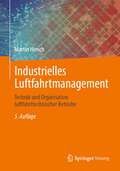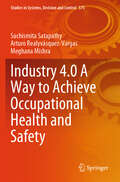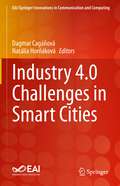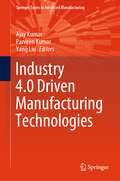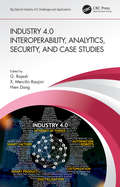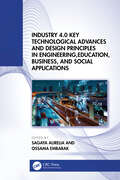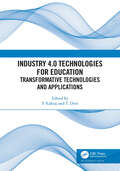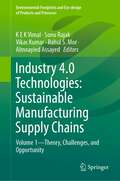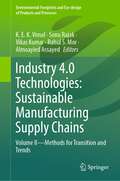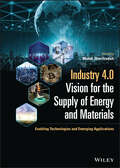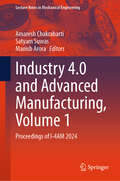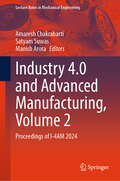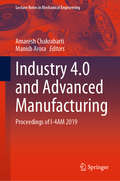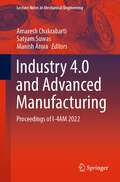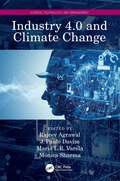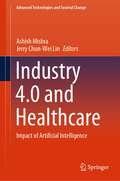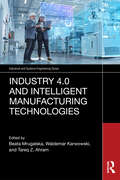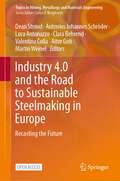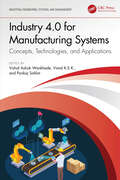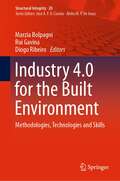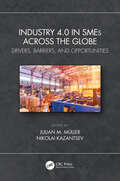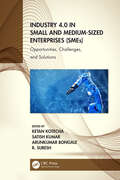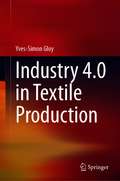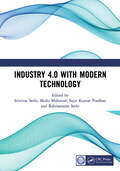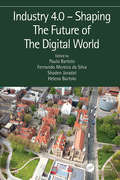- Table View
- List View
Industrielles Luftfahrtmanagement: Technik und Organisation luftfahrttechnischer Betriebe
by Martin HinschDieses Buch, das sich als Standardwerk in der Luftfahrtindustrie etabliert hat, beschreibt den Aufbau und die Aktivitäten luftfahrttechnischer Betriebe. Dies sind Unternehmen, welche Teile, Komponenten, Baugruppen und Triebwerke für Luftfahrzeuge oder die Luftfahrzeuge selbst entwickeln, herstellen oder instandhalten. Die technische Luftfahrtbranche weist erhebliche Spezifika auf, da deren Aktivitäten maßgeblich durch die Regularien der zuständigen Luftaufsichtsbehörden bestimmt werden. Somit nehmen die EU und die europäische Luftfahrtbehörde EASA erheblichen Einfluss auf Betriebsorganisation und Managementsystem, die Personalqualifizierung sowie die Leistungserbringung selbst. Diese Besonderheiten, Zusammenhänge und Abläufe werden im Buch sowohl aus Sicht des Luftrechts als auch aus dem Blickwinkel der betrieblichen Praxis thematisiert. In der 5. Auflage wurden die Vorgaben der EASA-Regelwerke aktualisiert und dabei insbesondere die Anforderungen zum Safety Management berücksichtigt. Neue Graphiken, Case-Studies und Praxis-Boxen verbessern die Praxisnähe.
Industry 4.0 A Way to Achieve Occupational Health and Safety (Studies in Systems, Decision and Control #575)
by Arturo Realyvásquez-Vargas Suchismita Satapathy Meghana MishraThis book consists of advances in data intelligence and its applications in sustainable computing and explores challenges of Industry 4.0. Occupational health and safety is a problem faced by many industries. It effects health, safety, and also wellbeing of employees and workers engaged. Industry 4.0 has changed the total scenario of many industries. Safety and sustainability are two major problems with most industries and other emerging sectors. So, safety is a most important criterion and is often taken care of by framing and following safety policies. Soft computing methods are used to resolve all innovative and research problems in engineering, manufacturing, and business management areas. Much innovative design and sustainable solutions are resolved by IoT and AI techniques. Any troublesome work without hard labor and with easy approaches can be resolved by IoT, which is safer and can be learned quickly. It will help research and find a significant replacement with innovative solutions to any technical and business-related problems. A huge and developing number of producers acknowledge generous monetary and natural advantages from feasible strategic policies. Manageable assembling makes items through financially strong cycles that limit adverse ecological effects while moderating energy and regular assets. Sustainable manufacturing also enhances employee, community, and product safety. A developing number of organizations are treating sustainability as a significant goal in their procedure and activities to build development and worldwide intensity practices in every place of manufacturing industries. Automation systems usually make workplaces safer by keeping people out of dangerous situations. They also encourage inclusion by substituting less physically demanding computer-based monitoring activities with jobs requiring strength or agility. The shift from a physically oriented to a knowledge-based work environment substitutes more intellectual, decentralised decision-making stresses for workplace problems like repeated actions.
Industry 4.0 Challenges in Smart Cities (EAI/Springer Innovations in Communication and Computing)
by Dagmar Cagáňová Natália HorňákováThis book discusses the next level of innovative technologies influencing sectors in industry and their future in industrial, urban and sustainable development. The authors provide a platform for a discussion of a synergy of ideas within smart industrial innovations, approaching them from various points of view. These include industry and management 4.0, the expansion of new business models, smart technologies identifying global challenges, and other new trends and opportunities. New managerial ideas, innovations, and technologies for advances in mobility are highlighted together from a multidisciplinary perspective. This book is relevant to researchers, graduate students and those who are interested in Smart Cities.Discusses unique angles in the fields of Industrial ManagementLinks various global challenges in Industry 4.0, IoT, and Smart City applications by analysing results in practice
Industry 4.0 Driven Manufacturing Technologies (Springer Series in Advanced Manufacturing)
by Yang Liu Ajay Kumar Parveen KumarThis book is a comprehensive guide to the latest advancements in manufacturing, adopting an Industry 4.0 approach. It covers the core principles of big data informatics, digital twin technology, artificial intelligence, and machine learning strategies. Readers will gain insights into the realm of cyber-physical intelligent systems in production, the role of blockchain, and the significance of information and communication technology. With a focus on real-time monitoring and data acquisition, the book offers practical solutions for online error troubleshooting in manufacturing systems. It explores a wide range of Industry 4.0-based applied manufacturing technologies and addresses the challenges posed by the dynamic market of production. Recognizing the lack of a cohesive resource on manufacturing advancements within the context of Industry 4.0, the authors have taken the initiative to compile this valuable knowledge from domain experts. Their goal is to disseminate these insights with this book. The book will be beneficial to various stakeholders, including industries, professionals, academics, research scholars, senior graduate students, and those in the field of human healthcare. With its comprehensive coverage, the book is an important reference for technical institution libraries and a useful reader for senior graduate students.
Industry 4.0 Interoperability, Analytics, Security, and Case Studies (Big Data for Industry 4.0)
by G. Rajesh, X. Mercilin Raajini, and Hien DangAll over the world, vast research is in progress on the domain of Industry 4.0 and related techniques. Industry 4.0 is expected to have a very high impact on labor markets, global value chains, education, health, environment, and many social economic aspects. Industry 4.0 Interoperability, Analytics, Security, and Case Studies provides a deeper understanding of the drivers and enablers of Industry 4.0. It includes real case studies of various applications related to different fields, such as cyber physical systems (CPS), Internet of Things (IoT), cloud computing, machine learning, virtualization, decentralization, blockchain, fog computing, and many other related areas. Also discussed are interoperability, design, and implementation challenges. Researchers, academicians, and those working in industry around the globe will find this book of interest. FEATURES Provides an understanding of the drivers and enablers of Industry 4.0 Includes real case studies of various applications for different fields Discusses technologies such as cyber physical systems (CPS), Internet of Things (IoT), cloud computing, machine learning, virtualization, decentralization, blockchain, fog computing, and many other related areas Covers design, implementation challenges, and interoperability Offers detailed knowledge on Industry 4.0 and its underlying technologies, research challenges, solutions, and case studies
Industry 4.0 Key Technological Advances and Design Principles in Engineering, Education, Business, and Social Applications
by Sagaya Aurelia Ossama EmbarakThis book offers an in-depth look at Industry 4.0’s applications and provides a conceptual framework for design principles and easy implementation. The book touches on the impact of Industry 4.0 and also examines the key technological advances and potential economic and technical benefits through case studies featuring real-world implementations.Industry 4.0 Key Technological Advances and Design Principles in Engineering, Education, Business, and Social Applications discusses the impact of Industry 4.0 and workforce transformation. The book examines the key technological advances that support Industry 4.0 and examines their potential economic and technical benefits through case studies. It covers the connection Industrial 4.0 has with IT and communication technologies and demonstrates the technological advancements and how to use their benefits towards and through examples of real-world applications.This book offers a conceptual framework and road map for those making decisions as they go through the next stage of transformation. This book mainly targets academicians, professionals, business professionals, start-up companies, and researchers at undergraduate, postgraduate, and doctoral levels.
Industry 4.0 Technologies for Education: Transformative Technologies and Applications
by P. Kaliraj T. DeviThe transformative digital technologies developed for Industry 4.0 are proving to be disruptive change drivers in higher education. Industry 4.0 technologies are forming the basis of Education 4.0. Industry 4.0 Technologies for Education: Transformative Technologies and Applications examines state-of-the-art tools and technologies that comprise Education 4.0. Higher education professionals can turn to this book to guide curriculum development aimed at helping produce the workforce for Industry 4.0. The book discusses the tools and technologies required to make Education 4.0 a reality. It covers online content creation, learning management systems, and tools for teaching, learning, and evaluating. Also covered are disciplines that are being transformed by Industry 4.0 and form the core of Education 4.0 curricula. These disciplines include social work, finance, medicine, and healthcare. Mobile technologies are critical components of Industry 4.0 as well as Education 4.0. The book looks at the roles of the Internet of Things (IoT), 5G, and cloud applications in creating the Education 4.0 environment. Highlights of the book include: Technological innovations for virtual classrooms to empower students Emerging technological advancements for educational institutions Online content creation tools Moodle as a teaching, learning, and evaluation tool Gamification in higher education A design thinking approach to developing curriculum in Education 4.0 Industry 4.0 for Service 4.0 and Research 4.0 as a framework for higher education institutions Eye-tracking technology for Education 4.0 The challenges and issues of the Internet of Things (IoT) in teaching and learning
Industry 4.0 Technologies: Volume 1—Theory, Challenges, and Opportunity (Environmental Footprints and Eco-design of Products and Processes)
by Vikas Kumar Rahul S. Mor Sonu Rajak Almoayied Assayed K E K VimalThis book brings forth the fundamental understanding of the role of Industry 4.0 technologies in sustainable manufacturing supply chain. Readers will get an overview of the challenges, opportunities, and requirements for the implementation of digital technologies and how they can support manufacturing supply chains to be sustainable. The book presents many applications of Industry 4.0 including integration of IoT, AI, Big Data, Blockchain, Procurement 4.0, Logistics 4.0, and Lean 4.0 in different contexts. The book therefore provides a platform for researchers, academicians, and professionals from diverse backgrounds to gain state-of-the-art knowledge for using Industry 4.0 in sustainable manufacturing supply chains. Readers will also be able to identify the practical significance and opportunities for future work directions.
Industry 4.0 Technologies: Volume II - Methods for transition and trends (Environmental Footprints and Eco-design of Products and Processes)
by Vikas Kumar K. E. K. Vimal Rahul S. Mor Sonu Rajak Almoayied AssayedThis book covers topics related to implementation of advanced technologies, such as AI, big data, procurement 4.0, Logistics 4.0 and Lean 4.0, in Industry 4.0 for the manufacturing supply chain. Many applications of Industry 4.0 in the manufacturing supply chain have been presented. The content of this book is useful for students, researchers and professionals in order to implement Industry 4.0 in manufacturing supply chain.
Industry 4.0 Vision for the Supply of Energy and Materials: Enabling Technologies and Emerging Applications
by Mahdi SharifzadehIndustry 4.0 Vision for the Supply of Energy and Materials Explore the impact of Industry 4.0 technologies on the supply chain with this authoritative text written by a leader in his field In Industry 4.0 Vision for the Supply of Energy and Materials, distinguished researcher and editor, Dr. Mahdi Sharifzadeh, delivers thematic, analytic, and applied discussions of the Industry 4.0 vision for supply chain design and operation. The book compiles all current aspects and emerging notions of Industry 4.0 into clusters of “enablers” and “analytics” of Supply Chain 4.0. Their multifaceted and highly interconnected nature is discussed at length, as are their diverse range of applications. You will discover uses of these new technologies ranging from the supply of conventional energy networks to renewables, pharmaceuticals, and additive manufacturing. You will also learn about their implications for economic prosperity and environmental sustainability. For each sector, this book scrutinizes current industrial practice and discusses developing concepts. Finally, the book concludes with potential future research directions of interest to industry practitioners and academics alike. Readers will also benefit from the inclusion of: A thorough introduction to connectivity through wireless communications and remote sensors An exploration of blockchains and smart contracts, as well as robotics and automation and cloud computing Practical discussions of supply chain analytics, including big data, machine-learning, and artificial intelligence, as well as supply chain modeling, optimization, and control A concise treatment of Industry 4.0 applications in supply chain design and operation, including the circular economy and the power industry An analysis of the oil, gas, and petrochemical industry, the pharmaceutical industry, and additive manufacturing Perfect for PhD-level and Postdoctoral researchers and industrial researchers, Industry 4.0 Vision for the Supply of Energy and Materials will also earn a place in the libraries of working professionals with an interest in the quantitative analysis of Supply Chain 4.0 concepts and techniques.
Industry 4.0 and Advanced Manufacturing, Volume 1: Proceedings of I-4AM 2024 (Lecture Notes in Mechanical Engineering)
by Amaresh Chakrabarti Satyam Suwas Manish AroraThis book presents select proceedings of the International Conference on Industry 4.0 and Advanced Manufacturing, abbreviated as I-4AM (pronounced i-forum), a biennial conference series, which intends to provide a platform to bring together all stakeholders in manufacturing and Industry 4.0. I-4AM enables those in academia and industry, in India and abroad, to deliberate on the nature, needs, challenges, opportunities, problems, and solutions in this transformational area. The topics covered include all areas of Industry 4.0 and advanced manufacturing, including but not limited to the following materials processing and joining, controls, autonomous systems, robotics, policy and entrepreneurship, supply chains, Industry X.0, digital manufacturing, sustainable manufacturing, and training and education. Industry 4.0 is about using connected intelligence to usher in greater productivity, quality, flexibility, safety, and resource utilization across manufacturing enterprises, in which advanced manufacturing technologies such as robotics or additive manufacturing play a critical role. The book discusses enablers for sustainable, affordable, and human-centric Industry 4.0 and showcases cutting edge practice, research, and educational innovation in this crucial and rapidly evolving area. It can serve as a valuable reference for researchers and professionals interested in Industry 4.0 and allied fields.
Industry 4.0 and Advanced Manufacturing, Volume 2: Proceedings of I-4AM 2024 (Lecture Notes in Mechanical Engineering)
by Amaresh Chakrabarti Satyam Suwas Manish AroraThis book presents select proceedings of the International Conference on Industry 4.0 and Advanced Manufacturing, abbreviated as I-4AM (pronounced i-forum), a biennial conference series, which intends to provide a platform to bring together all stakeholders in manufacturing and Industry 4.0. I-4AM enables those in academia and industry, in India and abroad, to deliberate on the nature, needs, challenges, opportunities, problems, and solutions in this transformational area. The topics covered include all areas of Industry 4.0 and advanced manufacturing, including but not limited to the following materials processing and joining, controls, autonomous systems, robotics, policy and entrepreneurship, supply chains, Industry X.0, digital manufacturing, sustainable manufacturing, and training and education. Industry 4.0 is about using connected intelligence to usher in greater productivity, quality, flexibility, safety, and resource utilization across manufacturing enterprises, in which advanced manufacturing technologies such as robotics or additive manufacturing play a critical role. The book discusses enablers for sustainable, affordable, and human-centric Industry 4.0 and showcases cutting edge practice, research, and educational innovation in this crucial and rapidly evolving area. It can serve as a valuable reference for researchers and professionals interested in Industry 4.0 and allied fields.
Industry 4.0 and Advanced Manufacturing: Proceedings of I-4AM 2019 (Lecture Notes in Mechanical Engineering)
by Amaresh Chakrabarti Manish AroraThis book presents selected papers from the 1st International Conference on Industry 4.0 and Advanced Manufacturing held at the Indian Institute of Science, Bangalore and includes deliberations from stakeholders in manufacturing and Industry 4.0 on the nature, needs, challenges, opportunities, problems, and solutions in these transformational areas. Special emphasis is placed on exploring avenues for creating a vision of, and enablers for, sustainable, affordable, and human-centric Industry 4.0. The book showcases cutting edge practice, research, and educational innovation in this crucial and rapidly evolving area. This book will be useful to researchers in academia and industry, and will also be useful to policymakers involved in creating ecosystems for implementation of Industry 4.0.
Industry 4.0 and Advanced Manufacturing: Proceedings of I-4AM 2022 (Lecture Notes in Mechanical Engineering)
by Amaresh Chakrabarti Satyam Suwas Manish AroraThis book presents selected papers from the 2nd International Conference on Industry 4.0 and Advanced Manufacturing held at the Indian Institute of Science, Bangalore and includes deliberations from stakeholders in manufacturing and Industry 4.0 on the nature, needs, challenges, opportunities, problems, and solutions in these transformational areas. Special emphasis is placed on exploring avenues for creating a vision of, and enablers for, sustainable, affordable, and human-centric Industry 4.0. The book showcases cutting edge practice, research, and educational innovation in this crucial and rapidly evolving area. This book will be useful to researchers in academia and industry, and will also be useful to policymakers involved in creating ecosystems for implementation of Industry 4.0.
Industry 4.0 and Climate Change (Science, Technology, and Management)
by J. Paulo Davim Monica Sharma Rajeev Agrawal Maria L.R. VarelaAt present, both Industry 4.0 and industrial engineering management developments are reshaping the industrial sector worldwide. Industry 4.0 and sustainability are considered as the crucial emerging trends in industrial production systems. The resulting transformations are changing production modes from traditional to digital, intelligent, and decentralized. It is expected that Industry 4.0 will help drive sustainability in industries thanks to the implementation of advanced technology and a move towards social sustainability. This book reflects on the consequences of the transition to Industry 4.0 for climate change. The book presents a systemic overview of the current negative impacts of digitization on the environment and showcases a new outline of the energy domain and expected changes in environmental pollution levels under Industry 4.0. It also analyzes the ecological consequences of the growth and development of Industry 4.0 and considers Industry 4.0 as an alternative to fighting climate change, in the sense of shifting the global community’s attention from environmental protection to consolidation of the digital economy. This book will be of interest to academicians and practitioners in the fields of climate change and development of Industry 4.0, and it will contribute to national economic policies for fighting climate change and corporate strategies of sustainable development under Industry 4.0.
Industry 4.0 and Healthcare: Impact of Artificial Intelligence (Advanced Technologies and Societal Change)
by Jerry Chun-Wei Lin Ashish MishraThis book presents different stages of Industrial Revolution in artificial intelligence and its impact on industry 4.0 and Healthcare. It contains chapters prepared for the industrial landscape which is being transformed to the fourth stage with the rise of autonomous robots, contemporary automation, cyber-physical systems, the Internet of things, and the Internet of services for examining the circumstances of health care system for the future. It highlights the emerging trends in integration of different intelligent manufacturing systems and advanced information technologies. Additionally, understanding of the real-world issues using artificial intelligence and the solutions discussed in this book help the enormous numbers of techniques which can be applied for effective diagnosis and predicting diseases from health care data.
Industry 4.0 and Intelligent Manufacturing Technologies (Industrial and Systems Engineering Series)
by Waldemar Karwowski Beata Mrugalska Tareq Z. AhramThe world is undergoing a transformation driven by Industry 4.0 and intelligent manufacturing technologies. This book explores aspects of well-being and collaboration in industrial systems which were underscored by automation and security focus.Industry 4.0 and Intelligent Manufacturing Technologies explores the different ways in which technology disrupts and revolutionizes industrial management. It discusses the connection between engineering, science, and management, aiming to assist companies, researchers, and professionals navigate and excel in this transformation era. This book offers insights by examining Industry 4.0 and intelligent manufacturing technologies. It looks into the driving forces behind digitalization, automation, intelligent process control, artificial intelligence, and additive manufacturing. Lastly, the book showcases the seamless integration of advanced digital technologies into manufacturing and industrial processes.This book aims to attract managers and researchers to the field of industrial engineering. It also offers valuable insights for students, graduates, and educators focusing on industrial and business management. However, the content is not exclusive to these audiences and will be engaging for any reader with an interest in the subject matter.
Industry 4.0 and the Road to Sustainable Steelmaking in Europe: Recasting the Future (Topics in Mining, Metallurgy and Materials Engineering)
by Martin Weinel Valentina Colla Dean Stroud Antonius Johannes Schröder Luca Antonazzo Clara Behrend Aitor GotiThis open access book gathers original contributions focused on the transition of the European steel industry to Industry 4.0. It not only investigates how Industry 4.0 can enhance productivity, cost-saving, and sustainability in the steel industry but also helps to comprehend its broad consequences on employment, education and training, human resources, economic resilience and decarbonisation. The content engages with the international debate on Industry 4.0 through the lens of the steel industry from a multidisciplinary perspective. It encourages a scientifically grounded critical approach and includes contributions from humanities and technical disciplines, with a focus on the social dimensions of the phenomenon. This book draws strength from up-to-date international research projects and adopts a strong industry-based perspective, providing a thorough description and analysis of the state of the art of the European steel industry. It also analyzes the trends, outcomes, opportunities, and criticalities arising with the transition to the Industry 4.0 paradigm. The book is primarily based on the results of the European Steel Skills Agenda (ESSA) skills alliance project co-funded by the Erasmus+ programme of the European Union and supported by the European Steel Technology Platform (ESTEP). This is an open access book.
Industry 4.0 for Manufacturing Systems: Concepts, Technologies, and Applications (Industrial Engineering, Systems, and Management)
by Vishal Ashok Wankhede K. E. K, Vimal Pankaj SahlotThe book highlights the importance of intelligent decision-making in advanced production systems, and optimization of process parameters using fuzzy-based multi-criteria decision-making tools. It discusses the decision-making aspects of Industry 4.0 using machine learning and optimization techniques and helps in moving toward the digitalization of manufacturing systems. It further covers several important topics including the role of digital twins in advanced manufacturing processes, machine learning-based prediction of overall equipment effectiveness, intelligent quality control tools, and life cycle assessment models in Industry 4.0.Key features: Presents a conceptual framework to measure the readiness of adopting Industry 4.0 in advanced manufacturing systems. Discusses the impact of smart manufacturing on sustainable development and integration of Industry 4.0 and additive manufacturing. Covers topics such as intelligent automation systems, machine learning-based preventive maintenance, and the Internet of Things-enabled additive manufacturing in Industry 4.0. Explains cyber-physical system integration with Industry 4.0 technologies, cyber-physical systems in industrial robotics, and green cyber-physical systems. Illustrates optimization of process parameters using fuzzy-based multi-criteria decision-making tools and life cycle assessment models in Industry 4.0. This book is primarily written for senior undergraduates, graduate students, and academic researchers in the fields of industrial engineering, production engineering, mechanical engineering, supply chain management, and manufacturing engineering.
Industry 4.0 for the Built Environment: Methodologies, Technologies and Skills (Structural Integrity #20)
by Diogo Ribeiro Marzia Bolpagni Rui GavinaThis book discusses how the role of traditional construction professional is changing, providing a useful guide for practitioners who would like to upskill themselves. Lately, core concepts and methodologies for the Built Environment are presented providing definitions and applications on Building Information Modelling, Computational Design, Artificial Intelligence, Big Data, Cloud Computing, Data Analytics and Visualization, Lean Construction, Advanced Project Management, Sustainability, Geographical Information Systems, Advanced Business Models, Disaster Management, Quality Management, Health and Safety and Legal prospective. The book also shows the latest technologies for the Built Environment including Digital Twins, Reality Capture, Extended Reality, Gamification, Computational Construction and Manufacturing, Structural Health Monitoring, Smart Transaction and Cybersecurity. Trends in soft skills for the Built Environment are presented covering Digital Working, Communication, Self and Relationship Management skills and Critical thinking. The book is dedicated to professionals who would like to enhance their understanding and capabilities to operate in the Industry 4.0 for the Built Environment having a holistic and comprehensive overview.
Industry 4.0 in SMEs Across the Globe: Drivers, Barriers, and Opportunities
by Julian M. Müller Nikolai KazantsevThe field of small and medium-sized enterprises (SMEs) digitalization is becoming more mature and stands to significantly contribute to the full development of the agenda of Industry 4.0. Although national digitalization programs have their own goals, the common focus is on the role of SMEs in global value chains. Since SMEs are known to have challenges around Industry 4.0 implementation, this book integrates experience from 14 countries worldwide. Industry 4.0 in SMEs across the Globe: Drivers, Barriers, and Opportunities provides an in-depth overview of Industry 4.0 in SMEs, covering various national, historical, and geographical settings in nine European countries: Finland, France, Hungary, Italy, Poland, Russia, Lithuania, Serbia, and the UK, complemented by five other countries from around the world: Brazil, China, India, Iran, and the U.S. Each chapter describes the national digitalization program, along with barriers, drivers, and opportunities to implement Industry 4.0 in local SMEs. It subsumes the findings across these countries to identify common themes and clusters of drivers, barriers, and opportunities. The book concludes that there are common approaches of SMEs across the world to adopt Industry 4.0, which are to be understood to increase industrial competitiveness globally. This book is a great resource for digitalization leaders and laggards, business consultants and researchers, as well as Ph.D. and master’s students from industrial engineering and manufacturing backgrounds. Policy makers can also use the contents to better understand the commonalities and differences of national digitalization programs and further support SMEs in their digitalization process.
Industry 4.0 in Small and Medium-Sized Enterprises (SMEs): Opportunities, Challenges, and Solutions
by Ketan Kotecha, Satish Kumar, Arunkumar Bongale, and R. SureshFocusing on the broader areas of Industry 4.0 as it applies to small and medium-sized enterprises (SMEs), this book offers a smooth adoption of techniques and technologies and presents advances, challenges, and opportunities for implementation. It will also enhance the role of academia by training new engineers on Industry 4.0 and digital transformation. Industry 4.0 in Small and Medium-Sized Enterprises (SMEs): Opportunities, Challenges, and Solutions presents concepts of predictive maintenance, digital factory, digital twin, additive manufacturing, and machining for sustainable development. It discusses the challenges faced by adopting Industry 4.0 including new security and privacy measures in the whole smart manufacturing setup while also explaining the impact of Industry 4.0 on Lean production systems. Implementation recommendations in the form of case studies, research studies, and the role academia can play are also provided. Practitioners, research scholars, academicians, and those studying or working in the Industry 4.0 sector will find this book of interest.
Industry 4.0 in Textile Production
by Yves-Simon GloyThis book discusses the design of textile production within the framework Industry 4.0. Relevant research topics in the textile industry are identified and solutions are conceptualized, developed and implemented. This is followed by an evaluation of the solutions in which, among other things, the profitability is considered. Questions about the transfer of knowledge into the company complete the work. Industry 4.0 in Textile Production provides a rich investigation into and survey of textile production The informative cases studies, clear perspective, and detailed analysis make this book of great use to engineers, researchers and postgraduate students interested in the textile industry.
Industry 4.0 with Modern Technology: Proceedings of the International Conference on Emerging trends in Engineering and Technology, Industry 4.0 (ETETI-2023)
by Mufti Mahmud North Carolina Sujit Kumar Pradhan Rabinarayan SethiThis volume contains the papers presented at International Conference on Emerging Trends in Engineering and Technology-Industry 4.0 (ETETI-2023) being organized by the prestigious Indira Gandhi Institute of Technology, Sarang (An Autonomous institute of Govt of Odisha), India, during 6th and 7th May 2023.
Industry 4.0 – Shaping The Future of The Digital World: Proceedings of the 2nd International Conference on Sustainable Smart Manufacturing (S2M 2019), 9–11 April 2019, Manchester, UK
by Paulo Jorge da Silva BartoloThe City of Manchester, once the birthplace of the 1st Industrial Revolution, is today a pioneering hub of the 4th Industrial Revolution (Industry 4.0), offering Industry 4.0 solutions in advanced materials, engineering, healthcare and social sciences. Indeed, the creation of some of the city’s greatest academic institutions was a direct outcome of the industrial revolution, so it was something of a homecoming that the Sustainable Smart Manufacturing (S2M) Conference was hosted by The University of Manchester in 2019. The conference was jointly organised by The University of Manchester, The University of Lisbon and The Polytechnic of Leiria – the latter two bringing in a wealth of expertise in how Industry 4.0 manifests itself in the context of sustainably evolving, deeply-rooted cities. S2M-2019 instigated the development of 61 papers selected for publication in this book on areas of Smart Manufacturing, Additive Manufacturing and Virtual Prototyping, Materials for Healthcare Applications and Circular Economy, Design Education, and Urban Spaces.
